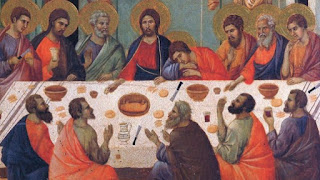Cruciform Variata
If a person thinks they can attain righteousness, life, and salvation by establishing in themselves a faith that is resolute, they will only return again to (a trusting dependence on) the impassioned working of their own heart and mind. And so while it is true that we stress mortification of all sin, Christianity teaches that it is precisely the inability to accomplish such casting off of lingering passions that characterizes fallen, worldly existence. For us, the moment when all calculation and effort are seen to be futile is itself the point in which the Gospel of Christ is realized in the disciple as saving faith, as true entrusting. Thus, we assert a concept of faith, not as an attitude of constancy or sincerity that the disciple assumes or generates toward Christ, but as the Spirit’s gracious inworking and unfolding of Christ's Gospel Word and power in the disciple as eternal Life. In this we emphasize the givenness of living faith, centering Christ’s Gospel on His directing or imparting of His eternal Life to fallen, sinful beings. Because there is no basis at all for such living faith or trust in fallen, sinful beings, to realize it is to undergo a transformation; our minds of good-and-evil passions are transformed into the mind of Christ, of humility, truth, and mercy. Our foolishness and ignorance, our multiform instabilities, however, are not eradicated. Rather, to be transformed means that our fallen condition, without being nullified or eradicated, is “carried” as suffering into the highest good, which is to say it is identified with the Cross of the Lord. Our impassioned minds, then, without being nullified, become pervaded with great wisdom and compassion, having as their content and substance our own defiled and egocentric passions and sins held in light of the singular Promise, the Promise of righteousness in Christ apart from anything wrought by us, driving us deeper into humility and higher into love, joy, and peace. Thus, only by realizing such living faith is it possible for us to break through self-love and see ourselves as we are without collapsing into either despair or pride, a faith that stands upon - indeed arises from - a deeper union with Christ.




We was not able to meet requirement of the lesser and weaker standard of Holiness contained in Law of Mosses, even more today, when standard of our Christian faith is that of Christ - sinlness perfection in all He told, in His more stricker and bigger Law, a chance for salvatin from our own merits that was hold by pharisies is gone; our salvation can be attain only by perfect life, burial and death of the Lord Jesus Christ - silness one - who fullfiled perfectly both all 613 commandents of the law of Moses and of His own. Glory to Lord Jesus Christ, for His salvation, that is proclaimed on all earth among all nations.
ReplyDelete